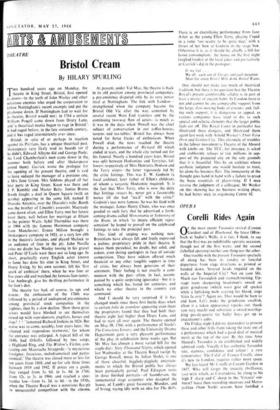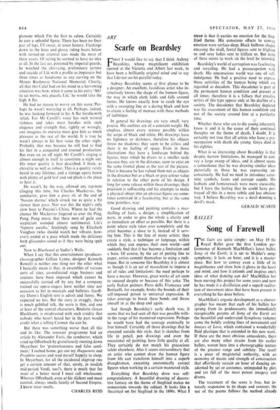OPERA
Corelli Rides Again
OF the most recent Turandot revival (Covent Garden) and of Bluebeard, the latest Offen- bach at Sadler's Wells. it is fair, I think, to say that the first was an indubitable operatic occasion, though not of the first water, and the second (labelled operetta) neither one thing nor the other.
One trouble with the present Turandot spectacle all along has been its tawdry or fanciful departures from stage directions as printed or handed down. Severed heads impaled on the walls of the Imperial City? Not on your life. Much too Tussaudish and stomach-turning. Up- stage team sharpening headsman's sword on giant grindstone (which must give off sparks) while a liplicking mob. craving for blood, sings `Lira la cote'? Again no. That would be ham to end ham. Let's make the grindstone smallish, allow it a token appearance (sparks out, thank you very much) and substitute a sword-worship- ping pas-de-quatre for ballet boys got up as executioner's aides.
On Friday night I did my damnedest to prevent these and other frills from taking the taste out of a performance which had a good deal of musical merit at the top of the cast. By this time Amy Shuard's Turandot is an established and widely admired study. Vocally it has authentic Turandot size, stamina. confidence and colour: a rare concurrence. The Calaf of Franco Corelli, since it's new to London, requires rather more space.
We last heard Mr Corelli at Covent Garden in 1957. Who will forget the tenacity (brilliance, too) with which, as Cavaradossi, he clung to his high F sharp and C sharp in the `Vittoria' out- burst? Since then recording successes and Metro- politan (New York) seasons have fortified a
glamour which I'm the first to salute. Certainly he cuts a splendid figure. There has been no finer pair of legs, ru swear, in tenor history. Fleshings down to the knee and glossy riding boots below with turned-up oriental toes made the most of these assets. Of acting he seemed to have no idea at all. In the last act, pinioned by imperial guards, he watched the chivvying, preliminary torture and suicide of Liu with a profile as impassive but three times as handsome as any carving on the Mount Rushmore National Memorial. Clearly, all that this Calaf had on his mind in a harrowing situation was how, when it came to his entry `Ah! to sei morta, mia piccola Liu,' he would take the high A flat.
He had no reason to worry on this score:Per- haps he wasn't worrying at all. Perhaps, indeed, he was looking forward to his A flat hurdleowith relish. For Mr Corelli's voice has such natural richness and takes most hurdles with such elegance and strength that, rightly or wrongly, one imagines its exercise must give him as much pleasure as the rest of the world. It is true he wasn't always in his best voice the other night. Probably that was because he still had to find his feet in a congealed and crusted production. But even on an off night Mr Corelli's singing is almost enough in itself to constitute a night out. His tenor quality is best described, I think, as chivalric as well as robust. This is a quality rarely heard in any lifetime; and a vintage opera house with plenty of gold leaf and red plush is the place to hear it.
He wasn't, by the way, allowed any top-note clinging this time, but Charles Mackerras, the conductor, gave him a poco rit. at the end of `Nessun dorma' which struck me as quite a bit slower than poco. Nor was this the night's only slow boat to Puccini's China. Where he had the chance Mr Mackerras lingered so over the Ping, Pang, Pong music that these men of guile and scepticism sounded almost sentimental. Lia's `Signore ascolta,' fetchingly sung by Elizabeth Vaughan (who should watch her vibrato, how- ever), ended at a pace which made the delicious harp glissandos sound as if they were being spelt out.
Now to Bluebeard at Sadler's Wells.
When I say that this entertainment (producer- choreographer Gillian Lynne, designer Kenneth Rowell) is neither one thing nor the other what I basically mean is that, in ensembles of various sorts of sizes, co-ordinated stage business and routines have been imposed which cannot be successfully carried off by any but a company trained (as opera-singers have neither time nor occasion to be) in musicals and balletics. Geoff- rey Dunn's English text is adroit and funny. We expected no less. But the story is straggly, there is much gabbled talk, the score is thin, and one at least of the central characters, Boulotte (Joyce Blackham), is misdirected with such crudity that nobody who hasn't heard her in the part would credit what a telling Carmen she can be.
But there was something worse than all this and its like. The souvenir programme had an article by Alexander Faris, the conductor, which cried up Offenbach by gratuitiously running down Meyerbeer for 'pretentiousness and false senti- ment.' I rushed home, got out my Huguenots and Prophete scores and read myself happily to sleep. In Meyerbeer, for all the incidental claptrap (we get a certain amount of that, surely, in modish mid-period Verdi, too?), there is much that for want of a better word I must call wholesome. Whereas Offenbach, even at his slickest and most scented, always smells faintly of Second Empire. 1 know nicer smells.
CHARLES REID



































 Previous page
Previous page